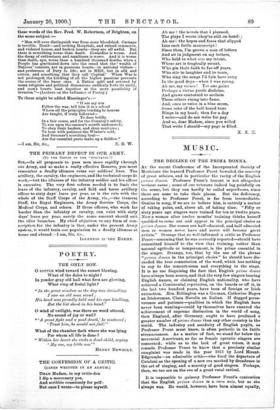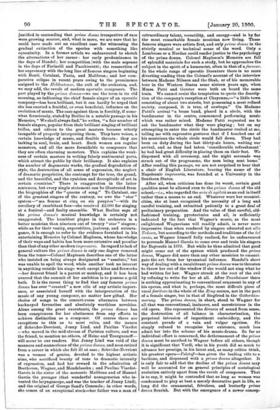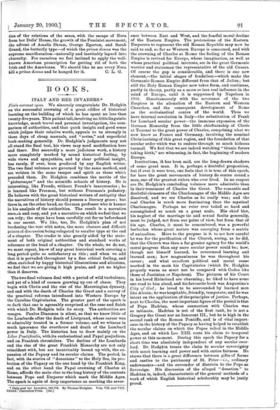MITSIC.
THE DECLINE OF THE PRIMA. DONNA..
AT the recent Conference of the Incorporated Society of Musicians the learned Professor Prout bewailed the scarcity of great soloists, and in particular the rarity of the English prima donna. Professor Prout's lament is not altogether without cause ; some of our veterans indeed lag painfully on the scene, but they can hardly be called superfluous, since there are none to take their places. But the deficiency, according to Professor Prout, is far from irremediable. Genius in song, if we are to believe him, is entirely a matter of taking pains, and, above all, of taking time. "Fifty or sixty years ago singers were trained for ten or twelve years. Now a woman after twelve months' training thinks herself qualified to come out and appear in the principal choirs as printa donna. She comes out half-educated, and half-educated men or women never have and never will become great artists." Strange that so well-informed a critic as Professor Prout—assuming that he was correctly reported—should have committed himself to the view that training, rather than natural aptitude or temperament, is the prime essential in the singer. Strange, too, that by the use of the phrase "prima donna in the principal choirs" he should have dis- carded the true connotation of the word, which has nothing to say to the concert-room and everything to the stage. It is no use disguising the fact that English prime donne have always been scarce, and that the very few singers bearing English names, or claiming English nationality, who have achieved a Continental reputation, on the boards or off it, in the last two hundred years, have been of foreign or Irish extraction. Mrs. Billington was a German, Catherine Hayes an Irishwoman, Clara Novello an Italian. If dogged perse- verance and patience—qualities in which the English have never been wanting—could by themselves have ensured the achievement of supreme distinction in the world of song, then England, after Germany, ought to have produced a greater number of prime donne than any other country in the world. The industry and assiduity of English pupils, as Professor Prout must know, is often pathetic in its futile strenuousness. As a matter of fact, we stand far below the mercurial Americans, so far as female operatic singers are concerned; while as to the lack of great voices, it may console Professor Prout to know that a precisely similar complaint was made in the year 1813 by Lord Mount- Edgcumbe—an admirable critic—who fixed the departure of Catalani as the opening of a new era marked by decadence in the art of singing, and a scarcity of good singers. Perhaps, then, we too are on the eve of a great vocal revival.
It is impossible to gainsay Professor Prout's contention that the English prima donna is a rara avis, but so she always was. He would, however, have been almost equally, justified in contending that prime donne irrespective of race were growing scarcer, and, what is more, we are sure that he could have made out an excellent case for witnessing the gradual extinction of the species with something like equanimity. In a former article we endeavoured to sketch the alternations of her career : her early predominance in the days of Handel ; her competition [with the male soprano in the days of Farinelli and Pacchierotti ; the reassertion of her supremacy with the long line of famous singers beginning with Banti, Catalani, Past; and Malibran ; and her com- parative eclipse in recent years owing to the prominence assigned to the Heldentenor, the cult of the orchestra, and, we may add, the revolt of modern operatic composers. The part played by the prima donna—we use the term in its old meaning, as indicating the chief female singer of an operatic company—has been brilliant, but it can hardly be urged that she has exerted a fruitful, or even beneficial, influence on the evolution of music. The case against them is forcibly, if some- what ferociously, stated by Berlioz in a notable passage in his Memoirs," We shall always find," he writes, "a fair number of female singers, popular from their brilliant singing of brilliant trifles, and odious to the great masters because utterly incapable of properly interpreting them. They have voices, a certain knowledge of music, and flexible throats : they are lacking in soul, brain, and heart. Such women are regular monsters, and all the more formidable to composers that they are often charming monsters. This explains the weak- ness of certain masters in writing falsely sentimental parts, which attract the public by their brilliancy. It also explains the number of degenerate works, the gradual degradation of style, the destruction of all sense of expression, the neglect of dramatic proprieties, the contempt for the true, the grand, and the beautiful, and the cynicism and decrepitude of art in certain countries." There is exaggeration in the latter sentences, but every single statement can be illustrated from the biographies of the "queens of song." To Catalani, one of the greatest singers of the century, we owe the " star " system—" ma femme et cinq on six poupees "—with its corollary of exorbitant fees—she received 22,000 for singing at a festival—and faulty ensemble. What Berlioz says of the prima donna's musical knowledge is certainly not exaggerated. The humblest player in the orchestra is a better musician than nineteen out of twenty " star " singers ; while as for their vanity, superstition, jealousy, and extrava- gance, it is enough to refer to the evidence furnished in his entertaining Memoirs by Colonel Mapleson, whose knowledge of their ways and habits has been more extensive and peculiar than that of any other modern impresario. In regard to lack of general culture the prima donna is only one degree removed from the tenor—Colonel Mapleson describes one of the latter who insisted on being always designated as " assoluto," but was unable to spell the word, while another took no interest in anything outside his stage work except kites and fireworks —her dearest friend is a parrot or monkey, and it has been averred that the summit of her ambition is to possess a gold bath. It is the rarest thing to find that any famous prima donna has ever "created" a new role of any artistic import. ance, or associated herself with the interpretation of the music of any young composer, no matter how gifted. Her choice of songs in the concert-room alternates between hackneyed favourites and absolutely worthless novelties. Alone among the great executants, the prima donna has been conspicuous for her abstinence from any efforts to achieve distinction as a composer. Of course there are exceptions to this as to most rules, and the names of SchrOder-Devrient, Jenny Lind, and Pauline Viardot —who moved in the mid-stream of Parisian culture, and was the friend, to mention no others, of Heine and Tourgueneff- will occur to our readers. But Jenny Lind was void of the manners and mannerisms of the prima donna, and soon retired from a career in which she felt ill at ease ; Schroder-Devrient was a woman of genius, devoted to the highest artistic aims, who sacrificed beauty of tone to dramatic intensity of expression, and had her reward in the admiration of Beethoven, Wagner, and Mendelssohn ; and Pauline Viardot- Garcia is the sister of the meteoric Malibran and of Manuel Garcia the younger (that wonderful nonagenarian who in- vented the laryngoscope, and was the teacher of Jenny Lind), and the original of George Sand's Consuelo ; in other words, she comes of an exceptional stock—her father was a man of extraordinary talent, versatility, and energy—and is by far the most remarkable female musician now living. These famous singers were artists first, and only prime donne in the strictly musical or technical sense of the word. Only a Lombroso or a Nordan could render justice to the psychology of the prima donna. Colonel Mapleson's Memoirs are frill of splendid materials for such a study, but he approaches the subject in the spirit of a humourist, often in that of a farceur. In the whole range of operatic literature there is no more diverting reading than the Colonel's account of the interview between Madame Nilsson and the Shah, or of his memorable tour in the Western States some sixteen years ago, when Mmes. Patti and Gerster were both on board the same train. We cannot resist the temptation to quote the descrip- tion of the company's reception at Cheyenne,—" a little town consisting of about two streets, but possessing a most refined society, composed, it is true, of cowboys." On Madame Patti's arrival "a brass band, placed in a circle, with the bandmaster in the centre, commenced performing music which was rather mixed. Madame Patti requested me to ask the bandmaster what they were playing ; but on my attempting to enter the circle the bandmaster rushed at me, telling me with expressive gestures that if I touched one of his musicians the whole circle would fall down. They had been on duty during the last thirty-six hours, waiting our arrival, and as they had taken 'considerable refreshment' he had had great difficulty in placing them on their feet. We dispensed with all ceremony, and the night serenade was struck out of the programme, the men being sent home." After reading this passage, we are not surprised to hear that a chair of English Literature, bearing the name of the Napoleonic impresario, was founded at a University in the Southern States.
After all, when criticism has done its worst, certain good qualities must be allowed even to the prima donna of the old school,—i.e., who regarded the aria di agilita as an end in itself rather than a means to an end. Whatever were her eccentri- cities, she at least recognised the necessity of a long and careful training, and submitted patiently to a great deal of preliminary preparation. And the value of that careful, old- fashioned training, pyrotechnics and all, is sufficiently indicated by the fact that Wagner's music, as the most enlightened Wagnerians will readily admit, is never more impressive than when rendered by singers educated not alla Tedesca, but according to the methods and traditions of the bel canto, as Wagner himself fully realised, for he endeavoured to persuade Manuel Garcia to come over and train his singers for Bayreuth in 1876. But while he thus admitted that good might come out of the system which produced the prima donna, Wagner did more than any other musician to emanci- pate the art from her tyrannical influence. Handel's short way of dealing with a recalcitrant prima donna was to threaten to throw her out of the window if she would not sing what he had written for her. Wagner struck at the root of the evil by refusing to write for her at all. After Tannhauser there is nothing approximating to conventional ornament in any of his operas, and what is, perhaps, the most difficult piece of vocal foriture in the whole of the Ring occurs, not in the part of a female singer, but in that of Siegfried in the Gotterdani- merung. The prima donna, in short, stood to Wagner for all that was conventional, insincere, and meretricious in the old opera. She represented the divorce of sound from sense, the destruction of all balance in characterisation, the perpetual intrusion of impertinent embroidery, and the constant parade of a vain and vulgar egotism. He simply refused to recognise her existence, much less admit her into the scheme of his music-drama. So far as individual effort is concerned, the dethronement of the prima donna must be ascribed to Wagner before all others, though it is significant that Verdi, who in his youth did so much to advance her prestige, in his latest and, as many critics think, his greatest opera—Fa/staff—has given the leading role to a baritone, and dispensed with a prima donna altogether. It is only fair to add that the decline of the prima donna may well be accounted for on general principles of sociological evolution entirely apart from the revolt of composers. That is to say, it might be contended that BO long as woman was condemned to play at best a merely decorative part in life, so long did the ornamental, frivolous, and butterfly prima donna flourish. But with the emergence of a newer concep-
tion of the relations of the sexes, with the escape of Nora from her Dolls' House, the growth of the Feminist movement, the advent of Amalie Skram, George Egerton, and Sarah Grand, the butterfly type—of which the prima donna was the supreme manifestation—naturally and inevitably lapsed into obscurity. For ourselves we feel inclined to apply the well- known American prescription for getting rid of both the Irish and the Americans. We should like to see every Nora kill a prima donna and be hanged for it. Cl. L. G.








































 Previous page
Previous page